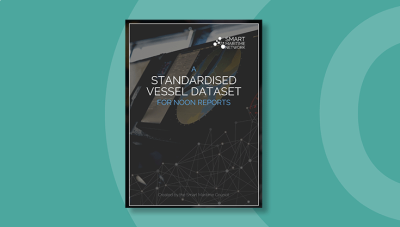Noon Reports Overview
Designed to increase the digital capabilities of the maritime industry, Smart Maritime Network’s Standardised Vessel Dataset (SVD) for Noon Reports project aims to provide a free and open list of defined data formats for common vessel operational data points typically found in the daily Noon Report. Below is an excerpt of their white paper on the topic.
Noon reports form an integral part of ship-shore communications. These reports are sent daily from vessels to shoreside offices throughout maritime voyages. Performed by the Chief Engineer, the report contains a variety of important data on the voyage at hand including voyage progress, average speed, engine and vessel performance, sailing conditions, fuel consumption and amount remaining onboard (ROB), ETA and more. While oftentimes, these reports will contain much of the same information, there is as of yet no standard, industry-wide report format that has been implemented.
The Smart Maritime Network, in partnership with leaders including Lloyd’s Register, recently developed a standardised vessel dataset for noon reports. They created a simple but comprehensive spreadsheet that can be used by ship owners and managers to ensure that all data received back from ships across fleets and throughout the industry is easily viewed, compared and analysed for enhanced productivity and strategic insight.
Why the Noon Report?
The Standardised Vessel Dataset (SVD) for Noon Reports project was initiated following discussions amongst members of the Smart Maritime Council, a cross-industry membership group focused on technology harmonisation, standardisation and interoperability that includes vessel operators, technology providers and other stakeholders.
As the Smart Maritime Council attempted to identify potential areas to target for standardisation, the Noon Report was chosen as a source of relatively simple data points (i.e., text and numbers) that would be common in meaning, though not identical in format, across different shipping companies. With almost all shipping companies preparing a Noon Report daily, in most cases manually, this provided an opportunity to choose ubiquitous data points with generally small identifiable variations in reporting.
Typical reporting items were selected, grouped by type (General Information, Weather, Fuel etc.), and listed with a text based description of what the item refers to – for example, ‘Position’ comes with the description ‘Current location of vessel at time of reporting’. These Noon Report elements were then organised into a structure with three basic components: a standard Data Point Name, Standard Units (or an agreed layout for reporting), and a specific ID based on the ISO 19848 reporting structure.

Expanding the Standardised Vessel Dataset
After much discussion and an initial proof of concept, suggestions were made as to how the standard dataset could be improved or expanded to increase the potential benefit to vessel operators.
Among the points raised was the idea of including vessel emissions data points in the standard list to support collection and analysis of data required for compliance with international regulations, such as the IMO Fuel Oil Data Collection System (DCS) and the EU Monitoring, Reporting and Verification (MRV) scheme.
As a mandatory requirement for various types of vessels, the data requested under these programmes will likely be as ubiquitous and commonly collected as Noon Report information by most shipping companies in the future, and as such should be included within a standard data point list.
After further examination by the Smart Maritime Council, it was decided that additions would be made based on the requirements of EU MRV as the more detailed of the two emissions reporting regimes. EU MRV regulations required reporting of fuel consumed, actual cargo carried onboard, and CO2 emitted, whereas IMO DCS only requires reporting of fuel consumed – therefore, a set of data points meeting EU MRV requirements would also cover IMO DCS compliance.
New additions to the standardised list of data points included a ‘Ship Type’ field, where the user can choose from one of 15 vessel types suggested by the EU MRV regulations, such as Passenger ship’, ‘Ro-ro ship’, ‘Container ship’, ‘Oil tanker’, ‘Chemical tanker’ etc. Also included was a field for the name of the vessel’s Departure Port and the time of departure, for use in calculating voyage hours.
Creating value from standardised data
The maritime industry stands to benefit from widespread adoption of standard data formats in the collection of vessel operational data. The Smart Maritime Council has taken on this project as a cross-industry collaborative body of relevant organisations in the sector and is making this open, independent and non-proprietary list of standard data points available free for use by any parties in the interests of supporting that process, to assist in the continued development of an efficient and sustainable shipping industry.
The Standardised Vessel Dataset (SVD) for Noon Reports, as well as related collection templates and supporting information, are available to download from the Smart Maritime Network website. In the future, it is hoped that this initial list will be continually expanded to add further standardised data points covering a wider range of use cases beyond the Noon Report, offering a central open reference catalogue of standard data formats free for use by all maritime and supply chain industry stakeholders. The Smart Maritime Council welcomes all suggestions for additions to the list and will take any submissions under advisement for inclusion in updated versions of the SVD.
Access the dataset spreadsheet, instructions and complete whitepaper.

